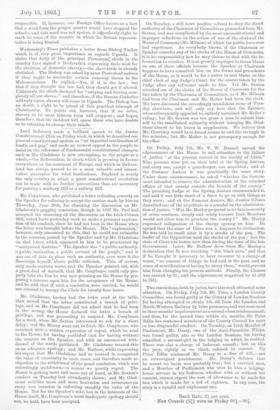On Tuesday, a still more positive refusal to obey the
direct authority of the Chairman of Committees proceeded from Mr. Sexton, and was complicated by the most unconstitutional and improper reflections on the action of one of the clerks of the House of Commons (Mr. Milman) of which the public have ever had experience. As everybody knows, if the Chairman or Speaker consults any of the clerks of the House of Commons, it is his responsibility how he may choose to deal with the in- formation he receives. It is as grossly improper to throw blame on one of these officials because the Speaker or Chairman happens to have consulted him on the forms and precedents of the House, as it would be for a suitor to cast blame on the chief clerk of any Judge's Court for the course taken by the Judge after any reference made to- him. Yet Mr. Sexton attacked one of the clerks of the House of Commons for the line taken by the Chairman of Committees, as if Mr. Milman had been the Chairman and Mr. Mellor had been the clerk. We have discussed the exceedingly scandalous scene of Tues- day elsewhere, and will only say here that the Speaker, when subsequently appealed to, entirely sustained Mr. Mellor's ruling ; but Mr. Sexton was too great a man to submit him- self to the established authority without bringing Mr. Glad- stone almost to his knees in supplication. We believe that Mr. Courtney would have found means to end the struggle in five minutes ; but Mr. Mellor is not peremptory enough for his office.


































 Previous page
Previous page